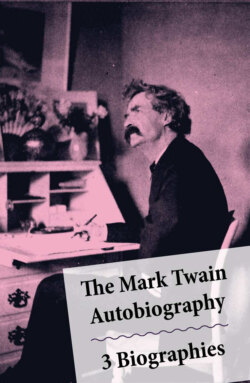Читать книгу The Mark Twain Autobiography + 3 Biographies - Mark Twain - Страница 48
На сайте Литреса книга снята с продажи.
IX.
ОглавлениеTable of Contents
He was the most caressing of men in his pity, but he had the fine instinct, which would have pleased Lowell, of never putting his hands on you — fine, delicate hands, with taper fingers, and pink nails, like a girl’s, and sensitively quivering in moments of emotion; he did not paw you with them to show his affection, as so many of us Americans are apt to do. Among the half-dozen, or half-hundred, personalities that each of us becomes, I should say that Clemens’s central and final personality was something exquisite. His casual acquaintance might know him, perhaps, from his fierce intensity, his wild pleasure in shocking people with his ribaldries and profanities, or from the mere need of loosing his rebellious spirit in that way, as anything but exquisite, and yet that was what in the last analysis he was. They might come away loathing or hating him, but one could not know him well without realizing him the most serious, the most humane, the most conscientious of men. He was Southwestern, and born amid the oppression of a race that had no rights as against ours, but I never saw a man more regardful of negroes. He had a yellow butler when I first began to know him, because he said he could not bear to order a white man about, but the terms of his ordering George were those of the softest entreaty which command ever wore. He loved to rely upon George, who was such a broken reed in some things, though so stanch in others, and the fervent Republican in politics that Clemens then liked him to be. He could interpret Clemens’s meaning to the public without conveying his mood, and could render his roughest answer smooth to the person denied his presence. His general instructions were that this presence was to be denied all but personal friends, but the soft heart of George was sometimes touched by importunity, and once he came up into the billiard-room saying that Mr. Smith wished to see Clemens. Upon inquiry, Mr. Smith developed no ties of friendship, and Clemens said, “You go and tell Mr. Smith that I wouldn’t come down to see the Twelve Apostles.” George turned from the threshold where he had kept himself, and framed a paraphrase of this message which apparently sent Mr. Smith away content with himself and all the rest of the world.
The part of him that was Western in his Southwestern origin Clemens kept to the end, but he was the most desouthernized Southerner I ever knew. No man more perfectly sensed and more entirely abhorred slavery, and no one has ever poured such scorn upon the secondhand, Walter-Scotticized, pseudo-chivalry of the Southern ideal. He held himself responsible for the wrong which the white race had done the black race in slavery, and he explained, in paying the way of a negro student through Yale, that he was doing it as his part of the reparation due from every white to every black man. He said he had never seen this student, nor ever wished to see him or know his name; it was quite enough that he was a negro. About that time a colored cadet was expelled from West Point for some point of conduct “unbecoming an officer and gentleman,” and there was the usual shabby philosophy in a portion of the press to the effect that a negro could never feel the claim of honor. The man was fifteen parts white, but, “Oh yes,” Clemens said, with bitter irony, “it was that one part black that undid him.” It made him a “nigger” and incapable of being a gentleman. It was to blame for the whole thing. The fifteen parts white were guiltless.
Clemens was entirely satisfied with the result of the Civil War, and he was eager to have its facts and meanings brought out at once in history. He ridiculed the notion, held by many, that “it was not yet time” to philosophize the events of the great struggle; that we must “wait till its passions had cooled,” and “the clouds of strife had cleared away.” He maintained that the time would never come when we should see its motives and men and deeds more clearly, and that now, now, was the hour to ascertain them in lasting verity. Picturesquely and dramatically he portrayed the imbecility of deferring the inquiry at any point to the distance of future years when inevitably the facts would begin to put on fable.
He had powers of sarcasm and a relentless rancor in his contempt which those who knew him best appreciated most. The late Noah Brooks, who had been in California at the beginning of Clemens’s career, and had witnessed the effect of his ridicule before he had learned to temper it, once said to me that he would rather have any one else in the world down on him than Mark Twain. But as Clemens grew older he grew more merciful, not to the wrong, but to the men who were in it. The wrong was often the source of his wildest drolling. He considered it in such hopelessness of ever doing it justice that his despair broke in laughter.
